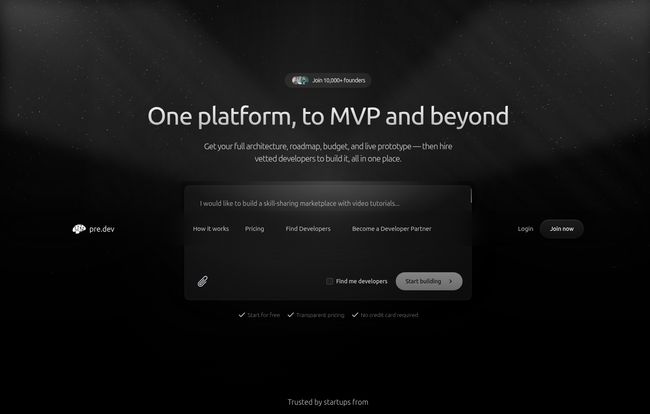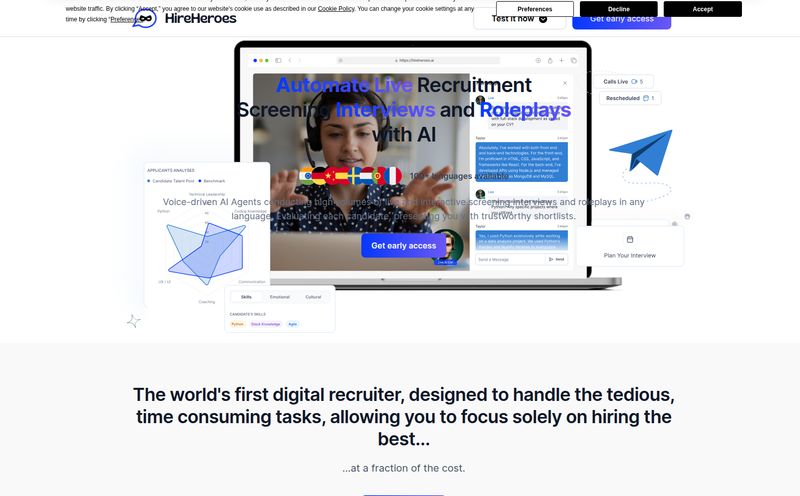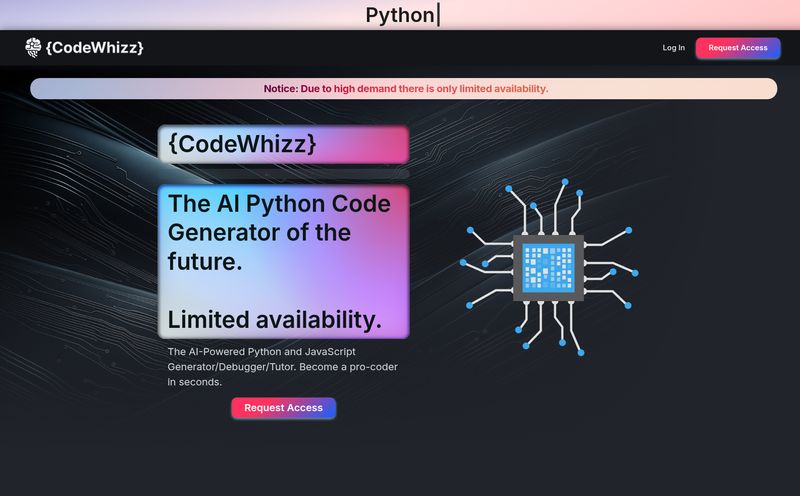How many of you have been in a kickoff meeting for a new software project, heart full of hope, only to see it derail weeks later because of scope creep, budget overruns, or just a fundamental misunderstanding of the work involved? Yeah, my hand is up, too. It’s a classic story in the tech world. The initial excitement gets swallowed by the slow, painful grind of endless documentation and guesswork.
I’ve seen project specs on napkins that were more detailed than some official documents. And the budgeting? It often feels less like a science and more like throwing darts at a board. In the dark. After spinning around ten times.
So when I heard about a platform called pre.dev that claims to use AI to predict software costs, create entire project plans, and even connect you with developers, my inner skeptic raised an eyebrow. But my inner, perpetually stressed-out project manager leaned in closer. Could this actually be the tool that tames the chaos of the pre-development phase? I had to find out.
What Even Is pre.dev?
At its core, pre.dev is an AI-powered platform designed for anyone who needs to turn a raw idea into a buildable software project. Think of it as a co-pilot for the earliest, most critical stage of development. It’s built for founders, product managers, and software development agencies—basically, anyone who’s ever stared at a blank screen and thought, "Okay, what now? And how much is this going to cost me?"
The whole pitch is about eliminating the tedious guesswork. You feed it your concept, and it spits out a comprehensive plan, a detailed budget estimation, and even a list of vetted developers who can actually build the thing. It's aiming to be the bridge between a brilliant idea and a tangible MVP, without the weeks of back-and-forth and spreadsheet wizardry.
The Core Features That Actually Matter
A tool is only as good as its features, right? Here’s what pre.dev brings to the table, and what got me genuinely excited.
AI-Powered Project Planning and Cost Prediction (The Crystal Ball)
This is the headline act. You describe your project in natural language, and the AI gets to work. It doesn't just give you a single, scary number. It generates a full project plan, breaking down the features, user stories, and technical requirements. Then, it estimates the cost. This isn’t just a random number; it's based on the specific features and complexity it identified. For founders trying to secure funding or PMs needing to get budget approval, this is an absolute game-changer. It turns a vague idea into a defensible plan.
Instant Prototypes and Architecture Visualization
Words are one thing, but seeing is believing. Pre.dev can generate interactive prototypes and technical architecture diagrams in minutes. This is huge. Suddenly, you're not just talking about a user login flow; you’re clicking through a basic version of it. You’re not just imagining the backend services; you’re looking at a diagram of how they connect. This ability to visualize the project early on prevents so much confusion down the line. It gets everyone on the same page, from the non-technical founder to the lead engineer.

Visit pre.dev
Finding Your Dream Team: Vetted Developers
A great plan is useless without a great team to execute it. One of the biggest hurdles for new projects is finding reliable talent. Pre.dev tackles this by creating a marketplace of pre-vetted developers and agencies. The fact that it's trusted by startups coming out of places like Y Combinator and Techstars tells me their vetting process is probably pretty solid. It's not just a directory; it's a curated pool of talent ready to work on projects that are already well-defined, thanks to the platform itself.
Seamless Integration with Jira and Linear
Here’s something for the practicing PMs out there. Once your plan is ready, you can export the entire roadmap directly into Jira or Linear. Thank goodness. This means you don’t have to manually copy-paste hundreds of user stories and tasks. It bridges the gap between planning and execution, letting your development team hit the ground running with a fully-fleshed-out backlog. This feature alone can save days of tedious administrative work.
Let's Talk Money: Breaking Down the pre.dev Pricing
Alright, so what’s the damage? The pricing structure seems pretty thoughtful, with options for different stages of a project's life. I appreciate that they have a free entry point, so you can kick the tires before committing.
| Plan | Price | Who It's For | Key Features |
|---|---|---|---|
| Basic | $0 /month | Curious individuals testing an idea. | 2 prototype generations, 2 project limit, basic analysis. |
| Solo Plus | $14 /month | Solo founders and freelancers. | 5 daily prototypes, unlimited projects, deep analysis, full roadmap. |
| Solo Premium | $49 /month | Serious builders and PMs. | 25 daily prototypes, Jira/Linear integration. |
| Developers as a Service (DAAS) | Custom Quote | Teams wanting an end-to-end solution. | Dedicated dev team, guaranteed hours, full product management. |
The Good, The Bad, and The AI-Generated
No tool is perfect. Let's get into the nitty-gritty. After playing around with it, here’s my balanced take.
The Good Stuff is pretty obvious. The time saved on documentation is immense. The ability to get a realistic budget estimate in minutes instead of weeks is, frankly, incredible. It brings a level of professionalism and clarity to early-stage projects that was previously only achievable with expensive consultants or a highly experienced in-house team. The speed at which you can go from "what if" to a clickable prototype and a full backlog is its superpower.
The Not-So-Perfect Stuff is also worth mentioning. First, this is an AI tool. It’s powerful, but it's not a sentient senior developer. You still need human oversight. The old saying "garbage in, garbage out" applies here; the quality of your project plan depends on the clarity of your input. Also, its ability to match you with developers depends on the available partners in their network. And for a bootstrapped founder, even the $14/month subscription could be a consideration, though I'd argue it pays for itself pretty quickley in time saved.
Who Should Use pre.dev (And Who Can Skip It)?
This platform really shines for a specific group of people. If you're an early-stage founder trying to build an MVP and secure your first round of funding, this tool is your new best friend. If you're a Product Manager at a startup or agency constantly juggling new project requests, this will streamline your workflow immensely. Development agencies can also use this to quickly generate proposals and scopes for potential clients, which is a massive competitive advantage.
Who can skip it? If you're at a massive corporation with deeply entrenched, rigid project planning protocols that take six months to approve a new font, pre.dev might be too agile for your environment. If you’re a hobbyist just coding for fun on the weekends with no intention of building a business, you probably don’t need this level of formal planning.
Frequently Asked Questions about pre.dev
- 1. How accurate is the AI cost prediction?
- In my experience, it’s surprisingly good for initial estimates. It's not going to be to-the-dollar perfect, but it provides a very solid ballpark that's far better than a wild guess. Accuracy improves the more detail you provide in your project description.
- 2. Can I bring my own developers or do I have to use theirs?
- You can absolutely use pre.dev just for the planning and documentation and then take that plan to your own team. The developer matching is an optional, added benefit, not a requirement.
- 3. Is the free Basic plan actually useful?
- Yes, it's perfect for trying the platform out. With two project plans and a couple of prototype generations, you can definitely get a feel for how it works and whether it's right for you without pulling out your credit card.
- 4. What makes this different from just hiring a freelance consultant?
- Speed and cost. You can get a detailed plan from pre.dev in minutes for a low monthly fee. A good consultant will take days or weeks and cost significantly more. Pre.dev is great for getting you 80-90% of the way there, and then you can use a consultant for final validation if needed.
- 5. Does the AI write the actual code for my project?
- No, and that's an important distinction. Pre.dev is a pre-development tool. It creates the plans, roadmaps, architecture diagrams, and prototypes. It sets the stage for human developers to write the code efficiently.
My Final Verdict on pre.dev
So, is pre.dev the magic bullet for all software development woes? Of course not. But it's a damn good tool that solves a very real, very painful problem. It brings order to the chaos of early-stage project planning.
It acts as a translator between the language of ideas and the language of development. By providing clarity on scope, budget, and architecture from day one, it sets projects up for success. It won't replace the need for smart founders and talented developers, but it gives them a much, much better starting line. For anyone in the startup or product world, I think it's not just a nice-to-have; it's a powerful strategic advantage.
References and Sources
- Official Website: pre.dev
- Startup Accelerator Mention: Y Combinator



